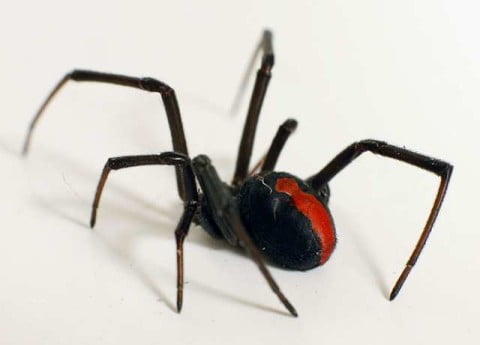A response to recent research on the subject.
Australia has been referred to in the past by some as “Venomland’; not surprising as we have some of the world’s most venomous snakes, we have venomous spiders, venomous jellyfish, venomous ticks, venomous octopus and we even have the world’s most venomous mammal.
 Image courtesy of Wikipedia
Image courtesy of Wikipedia
More about that on Friday though, when I have a special video for you as well as an app, not just an app but a free app, that could just save your life.
Emergency treatment
Of course, if you have venomous creatures that can kill, then it’s a good idea to have doctors who specialise in treating those whose lives are in danger. One such specialist is Professor Julian White (MB, BS, MD, FACTM), Consultant Clinical Toxinologist and Head of Toxinology at the Women’s & Children’s Hospital, Adelaide.
I was lucky enough to be able to interview him via email last week as I was keen to get his view on recent research suggesting that redback antivenom does not work.
I wrote about that particular development in December of last year, you can read about that in the update towards the foot of my post…
At the time I did wonder how this one would develop and as usual, there are two sides to every story, including this one.
Interview with Professor Julian White; March 2014
Who created the first batch of antivenom for the redback spider?
Red back spider antivenom was first released back in about 1956, by the Commonwealth Serum Laboratories, at that time a wholly government-owned pharmaceutical research and production organisation. In the early 1990s, or thereabouts, the government privatised the organisation and it was renamed CSL Ltd.
How much involvement have you had working on antivenom for the redback spider?
I am a clinician, treating patients, not an anti-venom researcher/developer. I have had no involvement in the production of this anti-venom, but I have been involved in using it to treat patients, on many occasions, dating back nearly 40 years.
What stage was it first felt that antivenom for the redback spider was not working?
Most clinicians treating red back spider bite with anti-venom would, in my opinion and experience, say it has always been an effective treatment for most patients, but there have likely always been a small minority of patients who do not respond as well, for reasons that remain obscure.
 Image courtesy of Laurence Grayson
Image courtesy of Laurence Grayson
Do you agree that currently this antivenom does not work?
Most definitely I do not agree with this statement, nor would most clinicians I have asked, nor would the large majority of patients who have received this anti-venom, and continue to receive it, when indicated.
The lead researcher claiming the anti-venom does not work appears to be claiming that any past perceived benefit from anti-venom was a psychological effect. I doubt most clinicians with experience treating red back spider bite would agree with that view. This is particularly so when treating infants and small children, but also in adults.
Since this researcher sought publicity about his claims that the antivenom does not work, I have been involved in treating a number of cases of major red back spider bite, where analgesia did not work and the patient then elected to try antivenom, despite having been told of this study, and had a rapid and good response to the antivenom, including cessation of symptoms such as profuse sweating and hypertension, that would be unlikely to be moderated so effectively through a purely psychological effect.
If it doesn’t work, why has nobody died from a redback spider bite since its introduction?
The premise of this question is incorrect; I consider the antivenom does work, and very well, in most cases.
Latrodectism, the syndrome of systemic envenoming caused by bites by widow spiders (the Australian red back spider is a widow spider), causes unpleasant effects for the patient, but only very rarely would envenoming directly result in death. There are few deaths recorded for any widow spider and most of those deaths date back more than 50 years ago, when medical care was less sophisticated than now.
If we stopped using red back spider antivenom, but still provided modern medical care, I would expect very few, if any, deaths to result.
However, I would expect a significant proportion of patients with red back spider envenoming to become more unwell, a few, maybe, critically ill, and to have a prolonged period of misery and time off work. There would likely be a significant social and financial cost to the community, but quantifying that would likely be difficult, maybe impossible.
 What do you think the treatment for redback spider bite will be going forward?
What do you think the treatment for redback spider bite will be going forward?
I consider most doctors will continue to use red back spider antivenom to treat cases with significant envenoming, as they have, successfully, in the past.
Are there plans to work on a new antivenom for this spider?
(Before reading Julian’s answer, you might like to know that “latrodectism” means poisoning due to the bite of a spider of the genus Latrodectus, which includes the redback spider.)
You would need to ask CSL that question, but I doubt they would consider it necessary as there is ample experience, over many decades, of the effectiveness of the current antivenom.
A single, unreplicated, and (I think, still) unpublished research finding questioning the effectiveness of this antivenom is unlikely to sway most doctors with experience treating this condition, most or all of whom will have seen cases (often many cases) where the antivenom clearly worked very well.
The researchers suggesting (through media releases, not, so far (to the best of my knowledge), through publication in a professional peer reviewed journal) that the antivenom does not work, appear to be proposing using analgesic (pain killing) drugs instead. There is a wealth of research in the peer reviewed literature, from around the world, indicating that analgesics are poorly effective in major latrodectism, especially compared to antivenom, when treating the pain seen in latrodectism.
Further, there are other symptoms caused by latrodectism that would not respond at all to analgesics, such as profuse sweating and hypertension (high blood pressure), yet these do respond to antivenom.
The venom of widow spiders contains potent neurotoxins that target parts of our nervous system. Antivenom will bind with these neurotoxins and result in them being rendered inactive and removed from the body, just like any other antigen (in this case, venom) and antibody (antivenom is antibody against venom) reaction.
It would be difficult, maybe impossible, to effectively treat all the effects of latrodectism using drugs (a complex mixture of drugs), with likely higher risks and lesser success, compared to a precise antidote, antivenom.
What would be more useful, though likely very difficult to achieve, would be to research why a small minority of patients do not seem to respond well to the antivenom. Venoms are generally complex, with a number of individual toxins, with any single toxin potentially having more than one target.
When the target(s) are in the nervous system, itself very complex, right down to the molecular level, the potential venom-target interaction possibilities can be many and difficult to study, or at least difficult to know whether you have discovered and studied every such venom-target interaction. We are still in the process of learning about how the human body works; we don’t know everything and what we don’t know can trip us up when conducting research.
Thank you Professor Julian White.
What does it mean to us?
As I said at the start, there are usually two sides to every story. Having already given you one side, I felt it was very important to give you the other side today. After all, if you are in hospital suffering the after-effects of a redback spider bite and your condition is worsening, it pays to be well informed.
If you are very unlucky, you might find yourself in a position where you need to say “yes” or “no” to a doctor offering redback spider antivenom to you as a suggested treatment.
Hopefully this article will help you with that decision.
Update: May 2014
There was one more question I wished I had asked in this interview, fortunately for me I got a second chance. See…







Can you confirm whether a young man in QLD who recently died following envenomation to his axilla by redback spider, was the first person to die since the availability of redback activenom? He was given antibiotics but do you know whether he was also administered antivenom?
I’ve read a few reports about this today, no one has specifically confirmed whether or not the young man received antivenom. I think we will all have to wait for the coroner’s report as well to find out the precise cause of death.
He was treated in hospital for four days for a severe abscess, I’m not even sure whether that was caused by the spider bite or not. He was, apparently, in a car accident not long before this incident as well. Lots of questions to be answered, we will just have to wait and see.
Very tragic though, he was only 22.
if someone offered you a “magic potion” would you choose that over paracetamol also ? let’s base our decisions on scientific evidence not emotion
Antivenom is not a ‘magic potion’, it is a real tried and tested approach to managing the pain caused by these spider bites. I’m not ready yet to buy into this latest ‘discovery’ that it doesn’t work, and I would certainly take it over paracetamol if I was in immense pain.
The latest university of Queensland research found that paracetamol was a cure if not antidote for red back spider bite . It was on the local ABC news and you can google it . 🙂 Anti-venom – Not necessary – Obsolete .
If I am lying on a hospital bed, temperature of 105° F, BP of 200/120, turning purple and vomiting and then someone offers me a paracetamol or the antivenom, I’m pretty sure I know which way I’m going 🙂
very unlikely your temp of 105 would be due to red back venom. more likely a complication such as infection.
My 10 yr old son received severe envenomation. No amount of paracetamol, anti-hyst. or morphine could dull the symptoms. He was anesthetised and anti venom given. When he woke the pain had reduced considerably, but he had severe muscle weakening, and was temporarily paralysed I s’pose you’d say. He was given a second dose of anti-venom as pain did not desist. It was amazing how it worked. However, it still took weeks for him begin attempting walking. Graduated from wheelchair, to walking frame, to crutches took months.
Another local suffered severe infection spent weeks in hospital and needed skin grafts. Wounds would not heal. Nasty business red backs if you have an allergy.
Sounds like your poor young lad has been through a seriously challenging time over this. Redback spiders can cause serious problems for young children, but a young child with maybe an allergy can make for a scary situation as you have seen.
Sounds like the antivenom did its job in the end which is fantastic news, I hope your boy makes a full recovery as soon as possible.